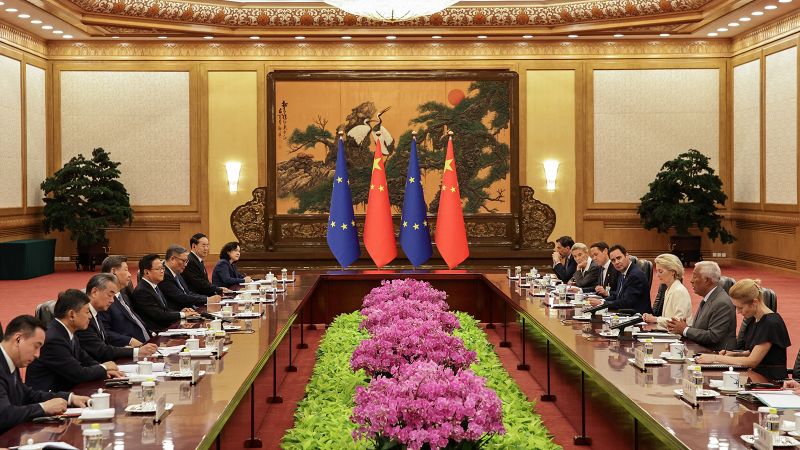Xi Jinping Calls on EU to Strengthen Ties Amid Global Trade Uncertainty

Beijing, China – In a pivotal summit marked by both cooperation and underlying tensions, Chinese President Xi Jinping urged European Union leaders to forge a stronger partnership, emphasizing the need for a “right strategic choice” to navigate current global trade turbulence and foster international stability. The meeting, held in Beijing, addressed a range of complex issues, from trade imbalances and market access to concerns regarding human rights and geopolitical alignment.
Xi’s remarks, delivered during a formal welcome ceremony and subsequent discussions, underscored China’s desire for a more collaborative relationship with the EU. He argued that in an increasingly volatile global landscape, characterized by protectionism and geopolitical competition, a united front between China and Europe is crucial for maintaining economic stability and addressing shared challenges such as climate change and global health crises.
“The world is facing unprecedented challenges, and cooperation is more important than ever,” Xi stated, according to a Chinese government readout of the meeting. “We believe that China and Europe should focus on cooperation, overcome differences, and work together to create a brighter future for our people and the world.”
The summit took place against a backdrop of growing trade friction between China and the EU. European leaders have voiced concerns over China’s trade practices, including intellectual property theft, subsidies to state-owned enterprises, and market access barriers. These concerns have led to calls for a more level playing field and a re-evaluation of the EU’s trade relationship with China.
However, both sides also acknowledged the immense economic opportunities presented by a strong partnership. China is a major market for European goods and services, while Europe is a significant source of investment and technology for China. The summit saw discussions around potential areas of increased collaboration, including green technologies, digital innovation, and sustainable development.
European Commission President Ursula von der Leyen, who led the EU delegation, emphasized the importance of a rules-based international order and the need for China to adhere to international commitments. She highlighted ongoing concerns regarding human rights in Xinjiang and Hong Kong, stating that these issues would remain a priority for the EU.
“We are committed to a balanced and reciprocal relationship with China,” von der Leyen said in a press conference following the summit. “We want to work with China on shared challenges, but we will also be firm in defending our interests and values.”
The summit concluded with a joint statement outlining areas of cooperation and acknowledging the need for further dialogue to address outstanding concerns. While significant disagreements remain, both China and the EU expressed a willingness to continue engaging in constructive discussions to shape a mutually beneficial and stable relationship. The future of Sino-European relations hinges on the ability of both sides to navigate these complexities and find common ground in a rapidly changing world.
Analysts suggest that the summit's outcome, while not groundbreaking, represents a crucial step in maintaining a degree of stability in a relationship facing increasing scrutiny. The emphasis on cooperation, even amidst disagreements, signals a recognition of the interconnectedness of the global economy and the shared responsibility to address pressing international issues.






